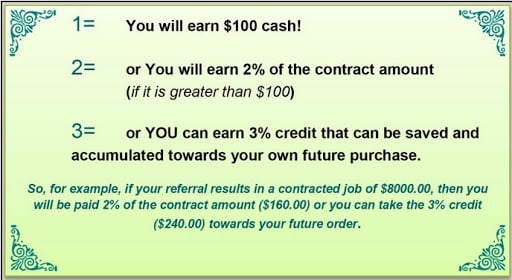If you’re looking for a more effective way to build relationships with business partners, generate high-quality business leads, and boost your profits, you might want to consider offering finder’s fees. Finder’s fees are rewards you give out to a third party for bringing your company potential new customers.
Finder’s fees are types of commissions that can range from small, informal gifts to much more significant amounts of money. But before giving out these rewards, your company will need to develop a finder’s fee agreement.
What’s in a finder’s fee agreement?
Finder’s fees aren’t only for people in the real estate industry. If your company decides to offer finder’s fees, it’s best to get all of the important details down in writing using a finder’s fee agreement (sometimes called a referral fee agreement). Having a clear set of ground rules established and agreed upon by all parties makes everything go smoothly.
Carefully consider all factors of a partnership when creating a referral fee agreement. This helps ensure that both parties are on the same page.
Free Download: Find all you need to create a finder’s fee agreement with our free referral agreement templates!
Beneficial reasons to create a finder’s fee agreement
Now that you know what this type of agreement is, you might be wondering what makes these types of new potential business opportunities so beneficial. Before we begin covering each section of this type of agreement, let’s look at a few beneficial reasons to establish this kind of agreement.
Saves time
There’s no doubting that most business professionals lead busy lives. Considering that, you might not have enough resources to capture the leads your business needs to generate. To save time, consider outsourcing your leads to third-party sales professionals or finders. This ensures your company is bringing in the customers, while you and your employees focus on other important business matters.
Having help growing your business
From time to time, most companies deal with times of slow growth or no growth at all. If this is happening to you, why not try and include finder’s fees as part of your partner incentive program? Contracting a finder to help increase sales does come with a cost.
But you might realize that offering a finder’s fee is the much-needed catalyst that moves your business out of a slump and into a new growth period. You can also pair this type of marketing with an incentive program for even greater potential business growth.
Carries less risk than other types of advertising
When you decide to start advertising your business, it’s important to accept that certain methods of promotion carry more risks than others. For instance, spending $10,000 on a television advertising campaign might not end up bringing you the valuable leads you’d expect. With a finder’s fee, on the other hand, you can control which stage of the sales funnel is best for you to spend money on for qualified leads.
Explaining the 6 major sections of this agreement
We put together some important guidelines to keep in mind as you start working on your finder’s fee agreement. But while we know a lot about referral marketing, we’re not legal experts. We strongly recommend you consult with a legal professional to create an actual finder’s fee document.
Now that we’ve got that out of the way, let’s look more closely at 6 essential sections of a finder’s fee agreement.
1. Compensation guidelines
People with an interest in becoming finders for your business want to know how much they’re going to get paid. In the compensation section of your agreement, make sure to clearly state the finder’s fee percentages, and the expectations you have before a payment will be made. It’s also a good idea to list at what point of the sales process your company will pay its finders, sometimes known as an effective date.
Finder’s fees are not always factored into the price of a product or a service. If your finder’s fee is substantial, it could lead to product/service price increases, and might dissuade potential customers from buying from you.
Unfortunately, not every new contact a finder brings you will necessarily yield a game-changing new business deal. It might be better for your business to pay out finder’s fees based on percentages of sales generated by new customers, instead of a flat rate for each new account.
Furthermore, if the finder merely furnishes the lead to the company, their fee should be lower than a finder who is commissioned to oversee the entire process up until a final sale.
You don’t want to pay too much for finder’s fees. At the same time, offering small rewards for finders isn’t going to be very enticing for them. Take time to calculate finder’s fees that are fair for all parties, especially your business.
2. Marketing methods
In every finder’s fee contract, you’ll see a section that discusses marketing methods. This section is included because finders will need to have a starting base of the marketing methods they will utilize to send customers your way. Make sure you outline the types of marketing your company does and doesn’t allow.
This section is also a good place to clarify the language used to discuss your product or service. For example, many brands in the supplement industry must carefully watch their language to avoid making false claims to the public about health benefits. Give as much direction as possible to your finders, as this is what they will use to bring more leads to your business.
3. Reimbursements
In certain situations, your finders might be spending money out of their own pockets to advertise to consumers and businesses. This requires companies to pay finders additional reimbursements to compensate these types of costs. Keep in mind these are costs in addition to the agreed upon finder’s fee percentage.
4. Confidentiality agreement
You’ll also want to include something that protects your company’s confidential information. Without a section that addresses your company’s confidential information, you might find yourself battling with a third-party company trying to make a profit off your business property.
5. Independent contractor status
Every company wants to take care of its finders. Despite these good intentions, businesses often aren’t ready to start offering contractors the same benefits as your full-time employees. It’s wise to include clear terms of your agreement that list finders as independent contractors. Without this being mentioned in the terms of this agreement, your company may end up having to pay an unnecessary amount in taxes and benefits.
6. Termination of this agreement
While working with a finder is a great way to gain new business, it also can come with certain risks. To keep your company safe, you must detail the exact situations that will nullify an agreement between your company and its finders (and save you from paying a finder’s fee). Here are a few situations where it might be best to terminate your agreement.
Low-quality leads: One of the most immediate risks of this entire agreement is what happens if the sales leads turn out to be low-quality or poorly qualified. If finders get paid regardless of the outcome, they might be less than thorough in researching their contacts before introducing them to your company.
Partnerships with competitors: Another risk when paying finder’s fees comes about when business relationships between finder and companies becomes strained. If this happens, your finders might start supplying their leads to your competitors. Unless there’s a specific “non-compete” language in the finder’s fee agreement that prohibits this, your steady flow of new business referrals could start going to the competition.
Free Download: Get started with our free finder’s fee agreement templates!
How to set up a finder’s fee agreement in Referral Rock?
In Referral Rock, you’ll set up a finder’s fee agreement by editing your terms and conditions page. Referral partners can access these terms by clicking or tapping the link on your main program page. They will automatically agree to the terms when they join the program, so the partnership can start right away. No need to wait for a signature!
In conclusion
While working with a finder does incur an additional cost per customer, if the price is right, a finder’s fee agreement might bring lots of new leads to your business.
Use the tips in this article to establish a fair and consistent finder’s fee agreement, and you will be on your way to reaching new customers, gaining access to new markets, and securing new business deals.





